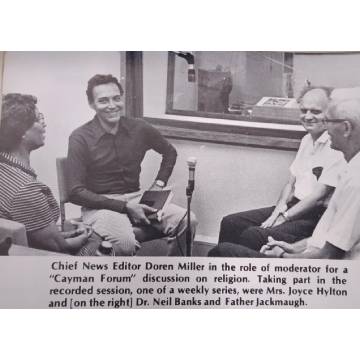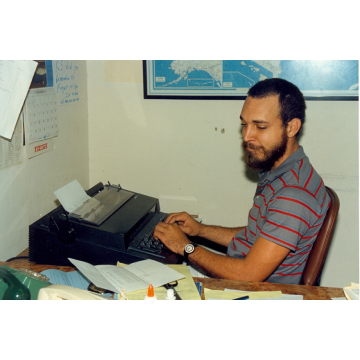News
UCCI’s Work-Based Learning Programme Continues Expansion

The University College of the Cayman Islands is welcoming a host of local businesses on board as it continues to expand a reenergized Work-Based Learning programme. In the past year, partners in the program have provided over $100,000 of support to students engaged in the program.
In the past, UCCI has partnered with numerous businesses in order to give students work experience and a taste of the careers they have an interest in. Such programmes also provide an opportunity for local businesses to develop talent and assess a student’s potential for long-term employment.
The newly formulated Work-Based Learning programme is funded primarily through philanthropic contributions and officials have elevated the commitment level required of participants. A preparatory phase, designed to ready students for the workplace environment, has also been added.
UCCI President and CEO Stacy McAfee said the new format is designed to better prepare students for the expectations of the workplace.
“One of our primary roles as a university is making sure we are addressing the needs of the Cayman business sector and preparing students who demonstrate the competencies needed to succeed in local professions. The Work-Based Learing programme is a collaborative effort that is designed to do just that.”
The two-semester programme first introduces students to jobs on campus, under the supervision of UCCI faculty and staff. During this time, students are taught basic workplace etiquette and the importance of meeting employer expectations. They apply what they are learning in the classroom to actual work experience.
In phase 2, employers work directly with students in the business environment. The programme requires that employers create jobs or internships for the students. Some businesses are establishing internships for students who wish to continue learning in the workplace.
Gina Peck, marketing supervisor with Progressive Distributors, said the company has worked with UCCI students since 2014. Gearing up for the new elements of the Work-Based Learning required some extra effort.
“That commitment can be fairly involved,” she said. “But the reward is so much more than what you put in. It’s great for me to see when a student can piece the theory learned with practical everyday business processes and realize where the foundations they are learning are eventually going to lead.”
CIBC/FCIB, recently became a partner in the programme. Sherrill Beckford, director of human resources for the international company, said the newly revamped programme offered an opportunity to reconnect with UCCI. She and other officers at CIBC/FCIB were impressed with McAfee’s vision for Work-Based learning, she said.
“We realized it was an opportunity for a fresh start,” said Beckford, who along with Managing Director Mark McIntyre, presented UCCI with a $25,000 check in October. “We have an obligation to explore any avenue that will contribute to the benefit of Caymanians.”
She said some of the funds will go toward the on-campus job program. Beckford also expects to bring her expertise to the campus, by providing seminars on workplace performance, and to possibly increase the number of summer interns the company takes on.
“We look forward to be able to pass it on and pay it forward,” she said.
Ritz-Carlton Director of Human Resources Janette Goodman said her company is planning to work with students studying hospitality services.
“The Ritz-Carlton, Grand Cayman is beyond delighted and proud to support the University College of the Cayman Islands,” Goodman said. “Through our Community Footprints program, our ladies and gentlemen are grateful for the opportunity to support our local students by sharing their skills, knowledge and insights of the hospitality industry. Now, more than ever, we appreciate the opportunity to give back and look forward to continue our partnership and support our community through this wonderful education and mentorship program.”
Chris Newell, operations supervisor for Corporate Electric, said his company has partnered with UCCI for years and is now part of the Work-Based Learning programme. He said it provides a practical payoff for businesses.
“I’m a big fan of taking young people and grooming them,” said Newell, whose company has been working with UCCI students for the past eight years. “It gives us a view of how engaged they are. Are they willing to put in the hard work? Anyone that shows the work ethic, they’re getting a job. We’ve hired a few right out of the programme.”
If more employers took part in such programmes, he said, there would be less need to bring in workers from outside Cayman.
“There is no reason to have such high numbers of work permits in the construction trades,” Newell said.
Andrew McCartney, managing director of the Royal Bank of Canada Dominion Securities, also sees an opportunity for improving the standing of Caymanian workers.
“We’re only as strong as the community we serve,” McCartney said of RBC.
By tailoring a similar program run by RBC in Canada, McCartney said he wants to provide a comprehensive exposure to the professional business environment for UCCI students, including everything from teaching them job interview techniques to the “soft skills and hard skills” of the banking business.
Such a program, he said, “will help these students to compete. We want to make sure that the young Caymanians are as equipped as the (job) applicants from abroad.
“Selfishly,” he added, “It gives us the opportunity to develop local talent and hire the best of the class.”
He also sees it as a programme that can work well across Cayman’s business spectrum.
“We would love to see all sectors of the community involved,” he said.
At the Caribbean Utilities Company, Felicia Deslandes, manager of human relations and employee development, said students have similar opportunities, which often work as stepping stones to a career. CUC has worked with UCCI students for many years and was pleased to join the updated programme.
“The Work-Based Learning offers a more enhanced training for students and actually better transitions those technical students into the workplace,” Deslandes said. “This is beneficial to CUC in that we get a more rounded student who is much better prepared to move into the workforce. As the programme continues to evolve, the students appear more engaged and typically begin to understand their roles along with our expectations a lot more.”
Rob McNabb, CEO of Logic, said his company wants to help pave the way for students getting ready to enter the workforce.
“Logic is proud to partner with UCCI supporting their Work-Based Learning programme,” he said. “We feel this is a positive step in supporting our young people and providing a foundation for their career paths.”
At the Water Authority Cayman, Pat Bell, the agency’s chief human resources officer, said Work-Based learning is a new avenue for getting students to think about water service as a career.
“Investing in the education and training of young Caymanians is a long-standing value of the Water Authority,” Bell said. “We are pleased to support students of UCCI through grants and the Work-Based Learning programme. We hope this support from the Water Authority will be of real benefit in assisting our local student population in achieving their higher education and career goals.
The agency has partnered with UCCI in the past through summer internships and scholarships for students who have shown an interest in the water industry. Work-Based learning is one more step in helping to build Cayman’s workforce.
No doubt, that workforce will also continue to have significant representation in the financial industry. Rawlinson & Hunter Limited, a leader in the financial services market, has joined forces with UCCI to help in that area.
“Rawlinson & Hunter Limited (“R&H”) recognises that training and development are crucial for growth and productivity,” said Kayla Shibli, the company’s sernior manager of human resources. “R&H is continuously seeking to employ young Caymanians who have an interest in building a career in the financial industry.”
After company officials met with McAfee late last year, the wheels were set in motion for R&H to become part of burgeoning programme.
“We felt that the Work-Based Leaning programme was ideal for helping us partner with young Caymanians who are committed to establishing successful careers after graduation,” Shibli said. “We hope that R&H can offer long-term opportunities to some of these candidates and, in this way, continue to assist young Caymanians in building the nation’s future.”
Most recently, Sol Petroleum Cayman joined the list of community partners in the program. General Manager Rosalind Robinson said the program will help broaden students’ experiences.
“Sol is delighted to partner with the UCCI,” Robinson said. “We believe that this program provides an opportunity for students to actively prepare for work life and engage with companies like Sol where, in our case, they can learn more about the job opportunities in the petroleum industry.
“We are thankful to be able to help in developing these students,” she added.
In the food industry, Foster’s and its sister company Progressive Distributors are both partners in the programme as well. Foster’s Managing Director Woody Foster said the handful of students involved at his company doesn’t make a big difference in overall operations. But when it comes to the wider impact the Work-Based Learning programme has on training young Cayman workers, he said, that’s another story.
“We see it as a big part of the solution,” Foster said.
It provides the kind of knowledge that students may not take from the classroom, he added.
“What you learn in school isn’t necessarily what you need when you get out in the trenches,” Foster said.
Providing students with that experience and a potential path to employment, he said, could eventually change Cayman.
“My management team and I, we want to do our part to save the world,” he said.
To learn more about UCCI’s Work- based Learning programme and to sign up as an employer please contact our student life department at studentlife@ucci.edu.ky or call 345 525-6052.












